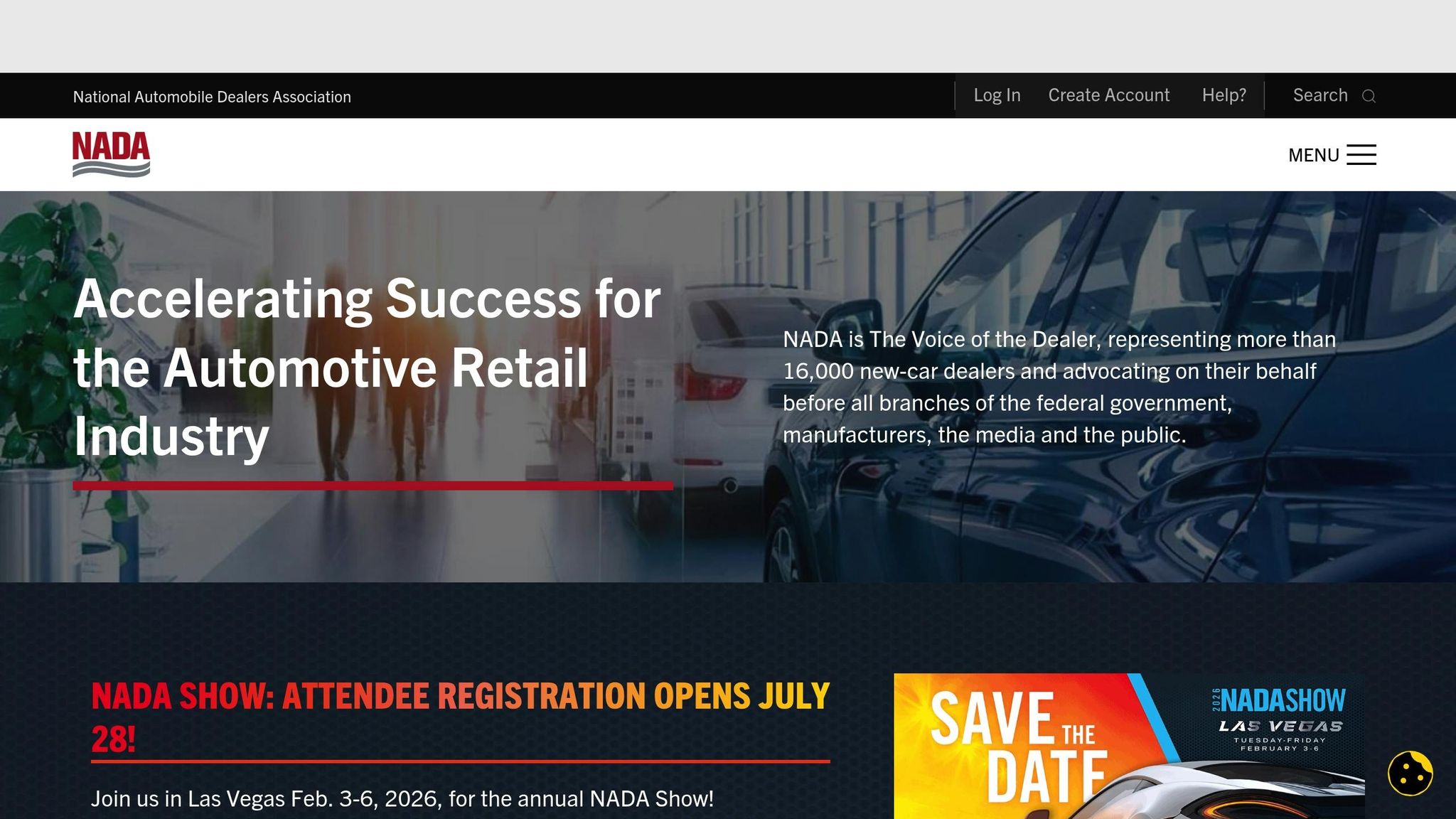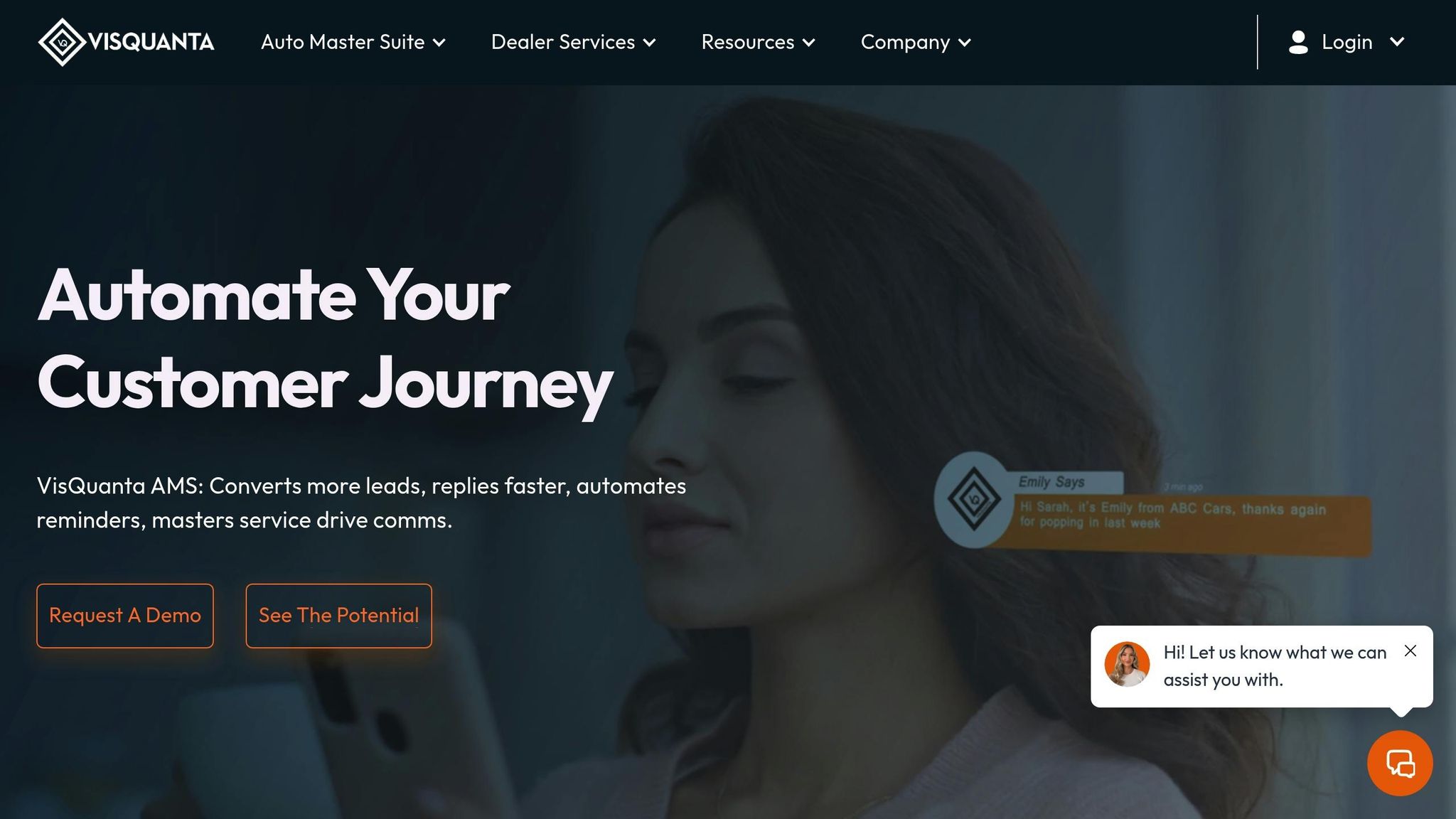Car dealerships across the U.S. are transforming how they reconnect with dormant leads using conversational AI. These tools automate follow-ups, analyze customer behavior, and send personalized messages to reignite interest - resulting in higher conversion rates and reduced workloads for sales teams.
Key Takeaways:
- Dormant Leads: 20–30% of dealership leads go inactive, representing missed sales opportunities.
- AI Impact: Boosts conversion rates by 10–15%, reduces response times by up to 70%, and revives up to 25% more leads.
- Personalization: AI tailors messages based on past interactions and preferences, increasing engagement by 74%.
- 24/7 Outreach: AI operates across SMS, email, chat, and social media, ensuring no lead is overlooked.
NADA 2025: VisQuanta: Humanized AI Lead Engagement for Dealers

How Conversational AI Works in Car Dealerships
Conversational AI is reshaping how dealerships operate by using CRM data to launch personalized outreach campaigns automatically. Here's a closer look at how integrating CRM systems, crafting customized messages, and providing multi-channel availability make this possible.
CRM Integration for Automated Follow-Up
At the heart of conversational AI's success is its ability to seamlessly connect with dealership CRM systems. By tapping into existing customer databases, these platforms pull detailed lead information - like prior interactions, vehicle preferences, budget constraints, and communication history - in real time. This allows for automated, data-driven outreach that replaces the time-consuming process of manual follow-ups.
For instance, Spyne's AI system tags leads as hot, warm, or cold based on their behavior and interest levels, syncing these insights directly with the dealership's CRM [3]. This automated classification enables sales teams to focus on high-priority leads while the AI re-engages dormant prospects.
Additionally, these systems retrieve live vehicle data - such as availability, pricing, and promotions - to further refine their messaging [3]. For dealerships considering this technology, it's essential to choose a CRM that integrates smoothly with existing tools like ERP and DMS systems. This ensures processes are automated and data remains accurate [4].
Personalized Messages for Each Prospect
Once the CRM data is integrated, AI takes it a step further by crafting messages tailored to each prospect. It analyzes multiple data points - past interactions, browsing habits, vehicle preferences, and communication patterns - to create outreach that feels personal and relevant.
Studies have shown that this level of personalization can reduce response times by over 80%, boost customer satisfaction to more than 90%, and increase conversion rates by roughly 20% [7].
In practice, this might mean referencing a specific vehicle a customer test-drove, highlighting features that match their preferences, or presenting financing options suited to their budget. AI can even analyze sentiment and intent from previous conversations, adjusting its tone and approach accordingly [6]. Additionally, it determines the best times and channels to reach each prospect, ensuring messages are sent when they're most likely to engage [7].
24/7 Communication Across Multiple Channels
Today's consumers expect instant responses at any time of day. Conversational AI meets this demand by being available round-the-clock across multiple channels - SMS, email, website chat, and social media - ensuring no inquiry goes unanswered.
Research indicates that customers are three times more likely to book when their questions are answered immediately [5]. This multi-channel approach allows prospects to engage through their preferred methods while maintaining conversation continuity. For example, a customer might start a chat on the dealership's website, continue through SMS, and finalize an appointment via email - all without losing context or personalization.
A March 2025 case study from Get My Auto highlighted the impact of AI-driven systems. After implementing Ava AI and the Get My Auto CRM, one dealer group saw a 40% increase in lead-to-appointment ratios, a 33% reduction in the time from first contact to sale, and a 30% drop in BDC staffing needs [2]. As of early 2025, 35% of auto dealerships had adopted AI in some form, with that figure projected to hit 50% by the end of the year [2]. Dealerships using AI have reported a 32% boost in lead-to-sale conversion rates, and AI systems are able to revive up to 25% more dormant leads compared to traditional methods [2].
Benefits of Using Conversational AI for Lead Re-Engagement
Using conversational AI to recover dormant leads can significantly boost lead recovery rates, speed up response times, and improve operational efficiency.
Database Reactivation and Lead Nurturing
Conversational AI excels at identifying the right moment to re-engage leads by analyzing behavioral signals. Instead of letting inactive leads collect dust, these systems ensure timely, personalized follow-ups that reignite interest.
Experts agree that cold leads don’t have to stay cold. AI can breathe life into these opportunities by delivering tailored messages precisely when they’re most likely to resonate [2].
Take, for instance, a March 2025 case study of a U.S.-based dealership group. By integrating conversational AI with their CRM, they managed to re-engage 94 previously neglected customers and 952 old leads within a single reporting period [2][1]. Even better, automated follow-up workflows added over $200 in extra profit per vehicle sold [2]. Quick and consistent follow-ups not only reactivate leads but also turn them into revenue drivers.
Faster Response Times (Speed-to-Lead)
Conversational AI ensures lightning-fast responses, addressing the critical window between a prospect’s initial contact and follow-up. By reducing first-response times by up to 70% [2], AI makes sure no lead is left waiting - no matter the time of day.
But it’s not just about speed. AI systems can answer qualifying questions, schedule appointments, and provide detailed vehicle information within minutes. This immediate engagement keeps prospects interested and significantly improves conversion rates. The combination of speed and scalability makes AI a smart, cost-efficient tool for outreach.
Scalable and Cost-Effective Outreach
One of the standout features of conversational AI is its ability to scale. By automating repetitive tasks, dealerships can engage more leads without adding staff. The financial payoff is substantial: for every $1 invested in AI, dealerships see a return of $3.50 [8]. Additionally, AI can save dealerships between $200,000 and $240,000 annually by taking over routine Business Development Center (BDC) tasks [2].
AI doesn’t tire, either - it makes calls consistently, ensuring persistent engagement across multiple touchpoints [8]. This level of scalability allows dealerships to revive up to 25% more dormant leads compared to traditional methods [2], making it an invaluable tool for any lead re-engagement strategy.
How to Implement Conversational AI for Lead Recovery
Using conversational AI for lead recovery is all about creating a balance between automation and a personalized touch. The goal is to make interactions feel seamless and genuinely helpful, building on earlier discussions about automated and tailored outreach.
Automated Drip Campaigns
Automated drip campaigns are designed to re-engage dormant leads through a series of timed messages. These campaigns maintain consistent communication without overwhelming the recipient, gradually encouraging them back into the buying process.
The most effective campaigns use lifecycle-aware messaging, meaning the content adapts to where a lead is in their journey. For instance, someone who looked at SUVs six months ago would receive different updates than a lead who recently test-drove a sedan.
AI plays a key role by tapping into CRM data to customize these messages, which has been shown to increase lead engagement by 33%. Timing is equally critical. AI can analyze behavior patterns to determine the best times to send messages, ensuring they land when prospects are most likely to respond. Instead of generic follow-ups like "Are you still interested?", successful campaigns provide meaningful updates, such as new inventory arrivals, market trends, or maintenance tips.
AI-Powered Appointment Scheduling
When it comes to scheduling, conversational AI offers real-time, automated solutions. It can handle complex scenarios, such as checking availability across multiple team members or locations. As soon as a dormant lead shows interest, the AI can suggest appointment slots, confirm bookings, and send details - all without human involvement.
This speed is crucial, as 80% of leads disappear within days due to delays or poor follow-up [10]. AI ensures immediate action, capturing interest while it's fresh. Additionally, it syncs with CRM systems to update lead statuses and schedule follow-ups. By the time the prospect arrives for their appointment, sales staff have all the context they need, from previous interactions to specific preferences.
Personalized Offers Based on Lead Behavior
AI takes personalization to the next level by analyzing lead behavior to craft tailored promotions. Instead of sending generic offers to everyone, it identifies which leads are most likely to respond to specific incentives.
For example, in service-related outreach, AI can send reminders based on vehicle age, mileage, or service history. A 2025 case study highlighted a 17% boost in customer retention for a Midwest dealership group that used AI to follow up on service appointments. The system provided personalized touchpoints after service visits, fostering stronger engagement and loyalty.
AI also combines chatbots with retargeted ads to keep leads engaged. These ads remind potential buyers of their previous interests, creating a multi-channel approach that keeps your dealership in their minds without feeling pushy. Personalized AI emails further enhance this strategy, achieving open rates over 45% and click-through rates nearly double the industry average. These results stem from AI's ability to send messages that are timely and highly relevant.
Another important aspect is the use of feedback loops. Conversational AI can periodically ask disengaged leads why they lost interest, using their responses to refine future strategies [10]. This ongoing learning process fine-tunes messaging and timing, leading to consistently better outcomes.
Using VisQuanta AutoMaster Suite for Lead Recovery

VisQuanta's AutoMaster Suite shows how AI can turn dealership strategies into real, measurable outcomes. This platform is specifically designed for automotive sales, helping dealerships recover and convert leads that might otherwise fall through the cracks. By bridging the gap between lead capture and conversion, it focuses on dormant prospects and brings them back into the sales funnel.
Unlike basic chatbots, the AutoMaster Suite offers a full lead management system. It integrates smoothly with existing dealership tools, automating key workflows while keeping personalization and compliance at the forefront - addressing the specific challenges U.S. dealerships face daily.
Core Features of AutoMaster Suite
The AutoMaster Suite tackles lead recovery through three main pillars: Lead Loss Mitigation, Speed-to-Lead, and Reputation Management.
- Lead Loss Mitigation: This feature focuses on reactivating inactive leads in your CRM. Instead of sending out generic follow-ups, the platform analyzes each lead's history and preferences to create personalized outreach campaigns that are both relevant and timely.
- Speed-to-Lead: Data shows that dealerships responding within five minutes are 21 times more likely to close a deal [12]. The AutoMaster Suite ensures immediate engagement with prospects, regardless of whether they come from website inquiries, social media ads, or third-party platforms.
- Reputation Management: Building trust is key to re-engaging prospects. The platform automates review requests from recent buyers and actively manages customer feedback. This helps dealerships maintain a positive online presence, encouraging potential customers to reconnect.
In addition to these pillars, the suite offers CRM and DMS integration, which synchronizes real-time AI interactions, appointment bookings, and lead scoring to eliminate data silos. Its custom workflow automation allows dealerships to adapt the platform to their unique processes, ensuring every customer journey is handled effectively.
These features not only drive results but also ensure compliance with industry regulations.
Proven ROI and Compliance Support
The AutoMaster Suite delivers measurable results, re-engaging up to 30% of cold leads and converting 5–11% into booked appointments [11]. This makes it a cost-effective alternative to acquiring new leads, which can be up to 10 times more expensive [12].
"We revive cold leads and drive appointment bookings. Dealers see up to 30% re-engaged and 5 to 11% booked back in."
- AutoMaster Suite, VisQuanta [11]
For example, in 2024, Smith Auto Group used the AutoMaster Suite to reactivate 227 dormant leads. This effort resulted in 8.1 additional vehicle sales and a 76% increase in conversions from cold leads.
The suite also prioritizes compliance, ensuring all automated follow-ups meet U.S. SMS regulations and industry standards. Features like opt-out management, message frequency limits, and consent tracking help reduce legal risks while maintaining effective communication.
To track performance, the platform offers a comprehensive dashboard that shows conversions, recovered revenue, and other key metrics. This visibility allows dealerships to refine their messaging and timing strategies continuously.
VisQuanta goes a step further with its dedicated Account Success management. This ongoing support helps dealerships optimize campaigns, fine-tune messaging, and adapt strategies based on performance data. It's no surprise that general managers and sales directors have rated the service 4.9 out of 5 [11].
Whether you run a single dealership or manage multiple locations, the AutoMaster Suite scales effortlessly. It handles large volumes of leads without sacrificing the personalized touch needed to turn dormant prospects into active customers.
Measuring Success and Optimizing AI Campaigns
Once dormant leads are reactivated using AI-driven strategies, the next step is measuring success through clear, actionable metrics. Tracking key performance indicators (KPIs) not only confirms the effectiveness of these campaigns but also highlights areas for improvement, helping dealerships fine-tune their AI efforts for better results.
Key Performance Indicators (KPIs)
The most impactful KPIs for AI-driven lead re-engagement focus on metrics directly tied to revenue, such as conversion rates, response times, and customer satisfaction. These benchmarks provide dealerships with a clear picture of their return on investment.
- Lead Reactivation Rate: This measures how many previously unresponsive prospects engage after AI outreach. Dealerships using AI have seen a 25% increase in reactivating dormant leads [1].
- Appointment Conversion Rate: Tracks how many re-engaged leads schedule appointments. For example, in March 2025, a Get My Auto client dealership recorded two reporting periods. In one period, from 1,046 buyer engagements, 94 dormant customers were revived, 952 old leads re-engaged, leading to 12 appointments, 3 of which were kept, and 1 car sold. Similar results followed in the second period with 1,009 engagements, 87 revived customers, and 922 re-engaged leads, resulting in 11 appointments, 3 kept, and 1 sale [1].
- Speed-to-Lead: This measures how quickly dealerships respond to new inquiries. AI has reduced time-to-first-response by up to 70% [1]. Audi, for instance, achieved a 30% reduction in lead response times through automated follow-ups [13].
| Metric | Purpose | Target Impact |
|---|---|---|
| Lead Reactivation Rate | Measures dormant prospect response | 25% increase typical [1] |
| Appointment Conversion Rate | Tracks scheduled meetings from re-engaged leads | Target: 10–15% conversion |
| Speed-to-Lead | Response time to new inquiries | Target: 70% reduction |
| Customer Satisfaction Score | Evaluates customer experience quality | Improved retention |
| Follow-up Consistency | Ensures consistent follow-up rates | 90%+ improvement [14] |
Additionally, Customer Satisfaction Score (CSAT) and Net Promoter Score (NPS) measure the quality of customer interactions, helping dealerships assess whether AI-driven communication is enhancing customer loyalty and generating referrals.
Continuous Improvement Through Audits
To keep AI campaigns relevant and effective, dealerships need to regularly review and refine their strategies. Monthly audits are a practical way to spot trends, adjust messaging, and fine-tune timing.
- Message Performance Analysis: Reviewing conversation logs helps identify which AI responses resonate most with prospects. This insight allows dealerships to refine scripts and improve conversion rates by focusing on what works.
- Timing Optimization: Sending messages at the right time can significantly impact engagement. Regularly analyzing outreach timing ensures that communications align with evolving customer behavior [13].
- Channel Effectiveness: Different customers prefer different communication methods - whether it's text, email, or phone calls. AI systems can track these preferences and adjust outreach accordingly for better results.
- Compliance Monitoring: Ensuring all automated communications meet U.S. SMS regulations and industry standards is critical. Regular audits help dealerships avoid legal risks while maintaining effective engagement.
VisQuanta's Client Support
To ensure dealerships get the most from their AI campaigns, VisQuanta provides extensive client support, offering tools and expertise to optimize performance.
- Performance Monitoring: VisQuanta's dashboard delivers real-time insights into key metrics like conversions and recovered revenue, enabling dealerships to adjust their strategies quickly.
- Account Success Management: Dedicated account managers guide dealerships in refining messaging, targeting, and overall campaign strategies based on performance data.
- Strategy Adaptation: As customer preferences shift, VisQuanta's experts analyze trends and recommend updates to keep campaigns effective.
- Training and Best Practices: Dealership staff receive training to interpret AI data, spot opportunities, and implement improvements that drive tangible results.
Conclusion: Growing Your Dealership with Conversational AI
For U.S. car dealerships aiming to boost lead recovery and achieve steady growth, conversational AI has become a game-changer. By early 2025, 35% of dealerships had already integrated AI into their operations, with projections suggesting this figure will hit 50% by the end of the year. It’s clear that this technology is no longer just a nice-to-have - it’s becoming a must-have to stay competitive [2].
The numbers speak for themselves. Dealerships leveraging conversational AI have seen up to 32% higher conversion rates, 70% faster response times, and a 25% increase in reengaged dormant leads. These improvements directly translate to higher profits and lower operational costs. For instance, a March 2025 case study from a Get My Auto dealer group highlighted some striking results: a 40% jump in lead-to-appointment ratios, a 33% reduction in first-contact-to-sale time, and a 30% decrease in BDC headcount, all while generating over $200 in additional profit per vehicle sold [2].
To replicate these outcomes, dealerships need to act with purpose. Start by integrating conversational AI chatbots to handle initial customer interactions. From there, build on this foundation with AI-powered websites and CRM workflows, aligning with the integrated CRM strategies discussed earlier. Equip your team to analyze lead scores effectively and keep a close eye on key performance indicators (KPIs).
As the automotive industry continues its digital transformation, customer expectations for quick, personalized service are only growing. Conversational AI empowers your sales team by taking over routine tasks and nurturing dormant leads, freeing up your staff to focus on high-value conversations that close deals.
The shift toward digital-first sales is accelerating, and dealerships that embrace these tools now will lead the pack. Companies using AI in their sales processes are already seeing 15–20% cost savings and 10–20% revenue growth. The question isn’t whether you should implement conversational AI - it’s how quickly you can get started [2]. By reactivating valuable leads and streamlining operations, your dealership can secure long-term growth and outpace competitors. The time to take action is now.
FAQs
How does conversational AI help car dealerships reconnect with dormant leads?
Conversational AI gives car dealerships a fresh way to re-engage dormant leads by diving into past interactions, preferences, and CRM data to craft personalized messages that resonate. These tools are designed to handle automated follow-ups, provide instant answers to questions, and reconnect leads with offers or updates tailored to their interests.
By making communication more focused and efficient, conversational AI boosts the likelihood of reviving interest and converting dormant leads into active prospects. This not only saves valuable time but also enhances both engagement and conversion rates in a meaningful way.
How can car dealerships use conversational AI to improve efficiency and boost lead conversions?
Car dealerships are turning to conversational AI to handle routine tasks, simplify communication, and re-engage potential buyers more efficiently. Tools like chatbots and automated messaging allow dealerships to qualify leads, tailor outreach, and maintain customer engagement around the clock - all while cutting down on time and costs.
This technology also speeds up response times and ensures follow-ups are timely and relevant, rekindling interest in leads that may have gone cold and boosting conversion rates. Beyond streamlining operations, conversational AI helps dealerships strengthen connections with prospects, paving the way for increased sales.
How can car dealerships stay compliant with regulations when using conversational AI?
Car dealerships must ensure they comply with major data privacy laws like the CCPA and GDPR. These regulations emphasize the importance of clear communication about how customer data is used and require obtaining explicit user consent. Implementing features like opt-out options is a practical way to honor customer preferences and meet these legal requirements.
To go further, dealerships should embrace AI governance frameworks that focus on transparency, address potential biases, and promote ethical data practices. Regular audits of AI systems and staying informed about evolving regulations are crucial steps to maintaining customer trust and avoiding legal complications.
.avif)




.jpeg)

.avif)




.svg)

